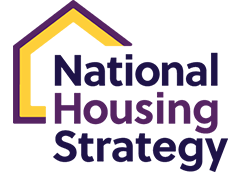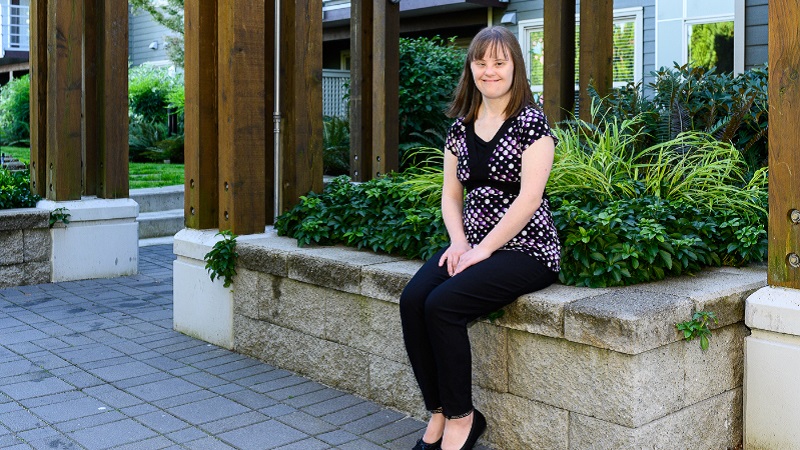 Krista Milne lives at Chorus Apartments, a building with rental homes for tenants with developmental disabilities and without disabilities.
Krista Milne lives at Chorus Apartments, a building with rental homes for tenants with developmental disabilities and without disabilities.
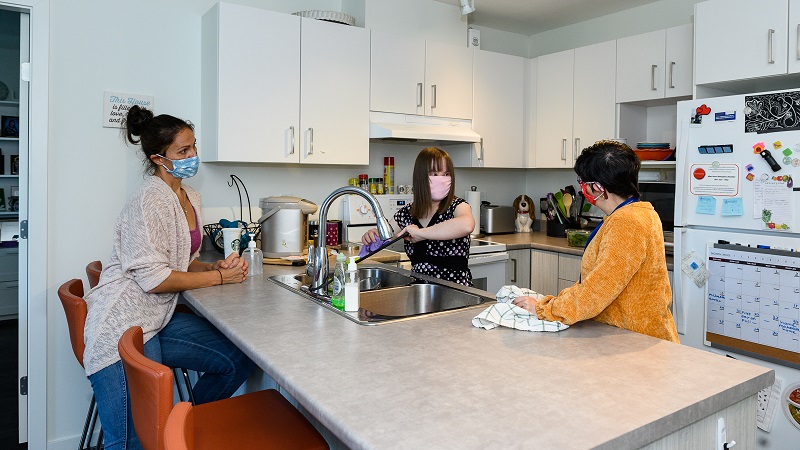 Chorus is the first building of its kind in Canada. Residents who need support receive enough to take care of themselves and gain a greater sense of community belonging.
Chorus is the first building of its kind in Canada. Residents who need support receive enough to take care of themselves and gain a greater sense of community belonging.
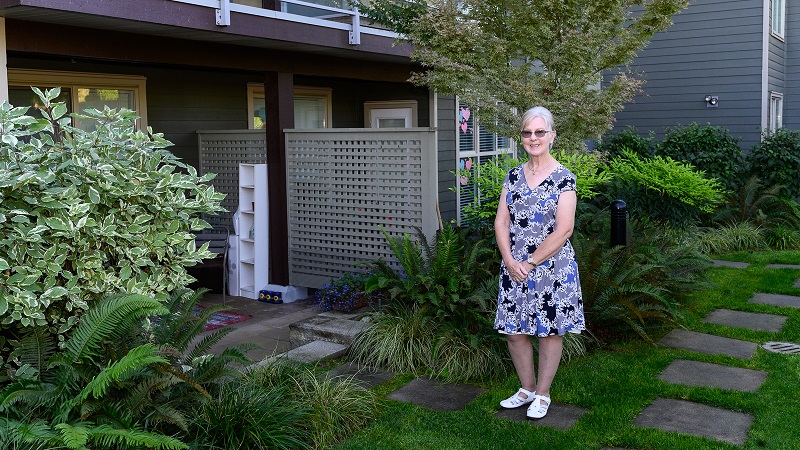 Marie’s daughter Tracey is a tenant at Chorus. Marie was worried about getting older and her ability to support Tracey at home. Chorus provided both Marie and Tracey with support and independence.
Marie’s daughter Tracey is a tenant at Chorus. Marie was worried about getting older and her ability to support Tracey at home. Chorus provided both Marie and Tracey with support and independence.
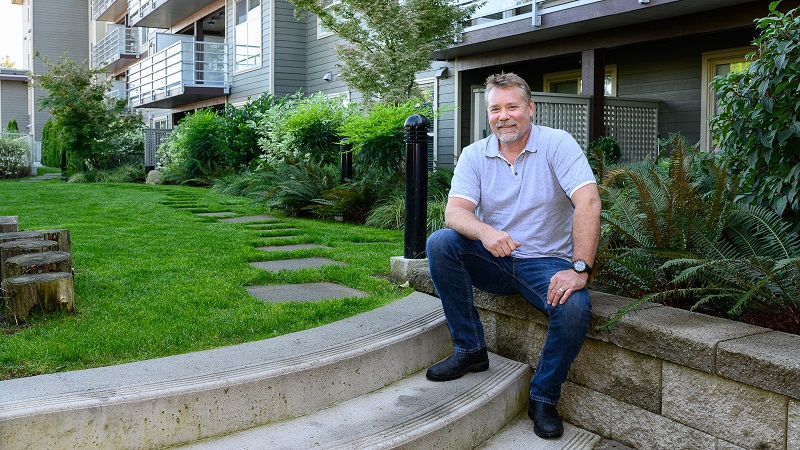 Chorus was created by partnership group UNITI. CEO Doug Tennant says that affordable, independent housing was a key priority for his clients with developmental disabilities and their families.
Chorus was created by partnership group UNITI. CEO Doug Tennant says that affordable, independent housing was a key priority for his clients with developmental disabilities and their families.
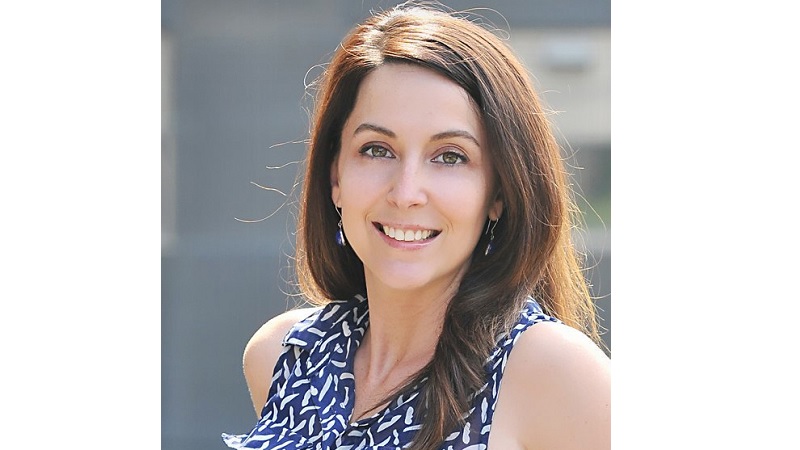 Tara Levandier is director of policy and program operations at Inclusion Canada. She says examples of innovative housing models like Chorus are few and relatively unknown to developers.
Tara Levandier is director of policy and program operations at Inclusion Canada. She says examples of innovative housing models like Chorus are few and relatively unknown to developers.
November 13, 2020
Independent living for people with developmental disabilities
Krista Milne is 33 and is like many young adults. She works at a local coffee shop in South Surrey, BC. She volunteers at the YMCA. She likes hanging out with friends and family, watching movies and listening to music. Unlike many young adults, she didn’t have many options to live on her own as a person with Down syndrome. Until recently.
Three years ago, she moved into Chorus Apartments, a building with rental homes for tenants with developmental disabilities and without disabilities.
This move changed her life.
“When I lived with my mom, she did everything for me,” says Krista. “Now that I’m living on my own, I‘m not waiting on my mom. I can do things the way that I like it. I have grown so much living here. Every day is a new experience for me.”
Marie Sabine noticed similar changes in her daughter Tracey, 51, when she moved into Chorus.
Tracey has a rare genetic disability, called Cornelia de Lange syndrome. With help from Chorus’ support staff, Tracey has become more independent, confident and social.
“She loves to cook and take care of her house… she’s quite a neat freak,” says Marie, teasingly. “She likes going out for lunch or dinner with friends and family – the things we all enjoy.”
The move has also benefited Marie.
“Like many parents of children with disabilities, I’d been worried about getting older and what would happen when I couldn’t support Tracey at home. Now I know she can take care of herself. Even during the COVID-19 crisis, she has chosen to stay at Chorus,” says Marie. “I’ve gained more independence too. A couple of years ago, I was able to take a trip to Europe. That’s something I never could have done before, without making lots of arrangements for someone to take care of Tracey.”
Chorus is the first building of its kind in Canada. It houses people with and without disabilities. The residents who need support are provided just enough so that they can take care of themselves and gain greater sense of belonging in the community.
Chorus was created by UNITI, a partnership between The Semiahmoo House Society, Peninsula Estates Housing Society and The Semiahmoo Foundation. Doug Tennant is CEO of UNITI and says one of the keys to the project’s success is the community was involved at every stage.
“We brought everyone together, then split them into 2 groups,” says Tennant. ”One group included the people with disabilities and the other group was family members. We asked them: What's important for you? What do you need to have a good life? Affordable, independent housing was at the top of the list for both groups.”
Examples of innovative housing models like Chorus are few and relatively unknown to developers. Inclusion Canada wants to change that.
Inclusion Canada is a national federation that works to advance the inclusion and human rights of people with an intellectual disability and their families. It has identified housing as a major factor in inclusion and quality of life.
Inclusion Canada worked with People First of Canada and their member organizations to develop a toolkit of resources for housing developers. This project, Pathways to Inclusive Development, was funded through the National Housing Strategy Demonstrations Initiative.
Welcome to Chorus! The project offers housing for people with and without disabilities. This inclusive housing model offers residents with disabilities both support and a life changing sense of community.
“There are some 120,000 Canadians with developmental disabilities who can't access affordable housing with the supports that they need,” says Tara Levandier, director of policy and program operations at Inclusion Canada. “That creates a huge barrier to gaining the independence and sense of belonging that we all want.”
“A large problem is that for many, the only options outside of living with family are group residences, or long term care facilities. So you have 30-year-olds living in nursing homes, or relying entirely on their senior parents for their personal care and financial health,” she continues.
For the demonstrations project, Inclusion Canada explored 3 innovative models to independent living:
- Chorus represented an agency-led approach.
- Legacy Homes in Brockville, Ontario demonstrated a modified life-lease model where community organizations navigate the complexities of home ownership on behalf of the owner.
- Community Living Toronto demonstrated a partnership-model bringing together local agencies, families and the housing sector to develop new housing.
The project found that when housing and disability supports are provided separately, residents can make their own decisions about where and how they want to live. It also showed that providing “just enough” support to residents with disabilities builds real community connections and inclusion.
The result of the project is a toolkit of case studies and videos interviews to help parent groups, community agencies and developers replicate these innovative models in their own communities.
“It’s important to inform people of their options from the outset and show the work that’s involved,” says Levandier. “You’re not just building housing, you’re building a community. There can be legal, financial, partnership and emotional barriers along the way. But we also wanted to highlight the positive impacts, and demonstrate that this is possible – and it’s happening in Canada.”
According to Levandier, “A rising tide raises all boats. When you support people who have developmental disabilities to live inclusive lives, you're solving problems for more than just the target population. You’re strengthening the community as a whole.”
The My Home My Community: Inclusive Housing Options National Demonstration Initiative (ON & BC) received funding through the NHS Demonstrations Initiative. This National Housing Strategy program showcases innovative practices, technologies, programs, polices and strategies with a goal to improve the performance, viability and effectiveness of affordable housing projects. This project was led by Inclusion Canada (formerly the Canadian Association for Community Living), in collaboration with the Institutes for Research and Development on Inclusion and Society, People First of Canada, Brockville and District Association for Community Involvement, Semiahmoo House Society, and Community Living Toronto. Note: Inclusion Canada is currently working on a new demonstrations initiative to promote homeownership options for people with developmental disabilities.
Other resources: NHS Project Profile

